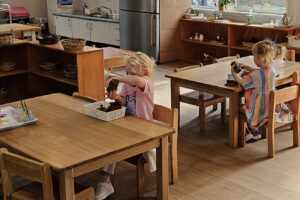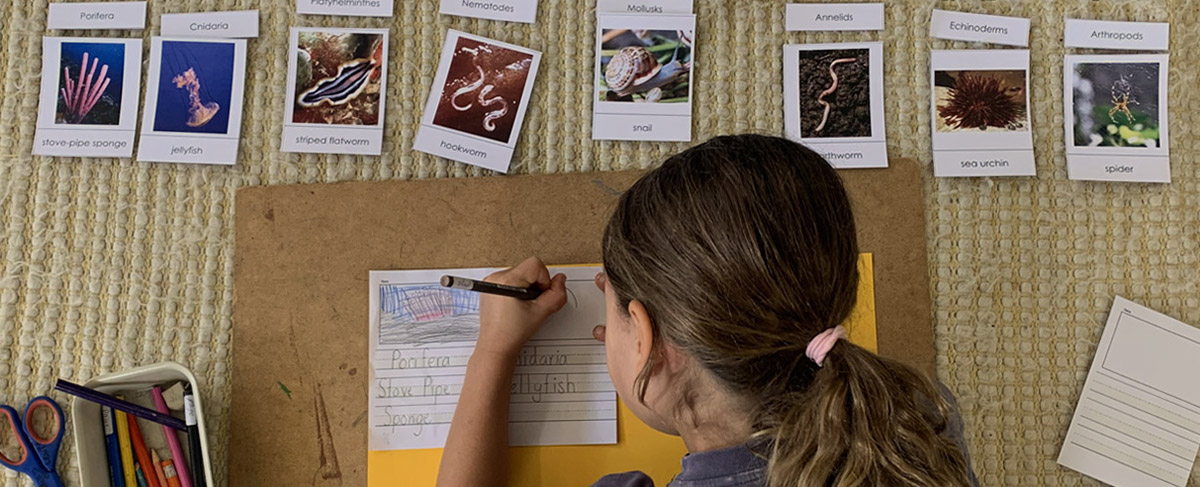2024 Newsletter Term 01 | Issue 02
- Posted by Farmhouse Montessori School
- Categories Farmhouse News
- Date February 29, 2024
Upcoming events & Important Dates
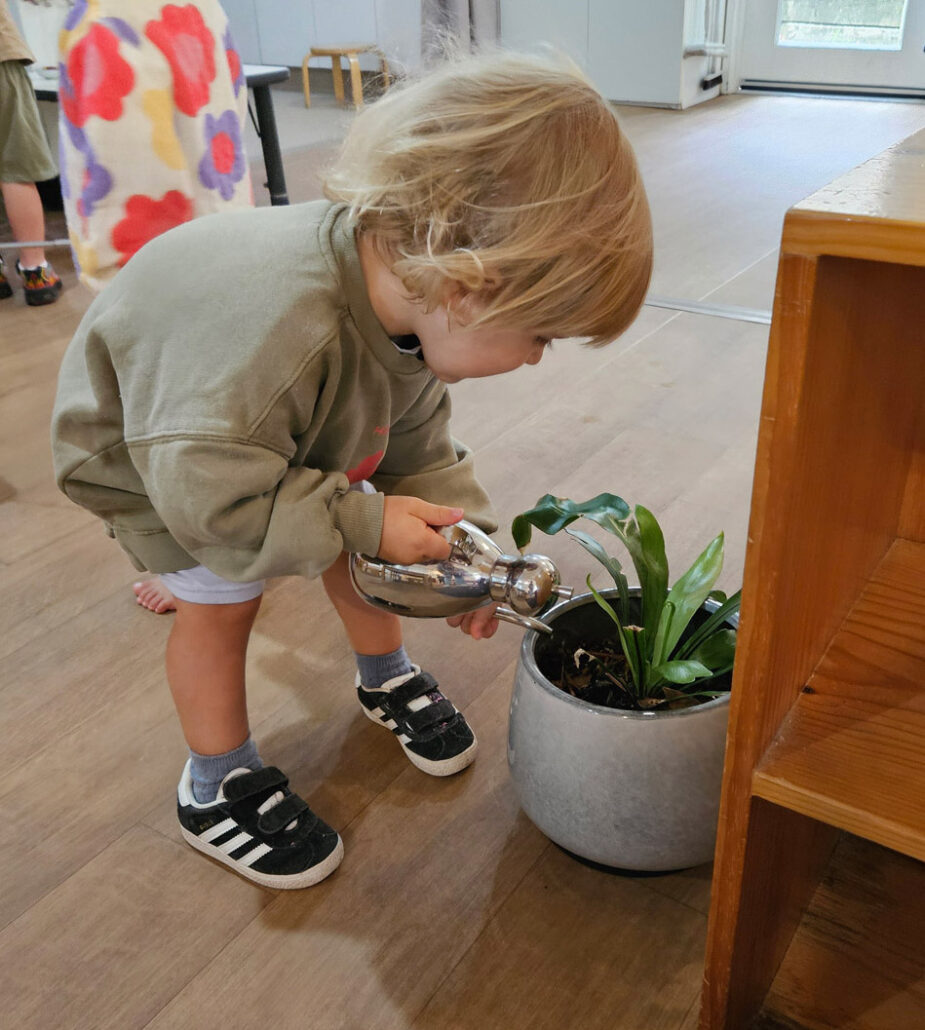
March 11th – Primary Parent Teacher Conferences (2 weeks)
March 12th – Primary School Tour 9:30 am
March 13th – Primary Campus NAPLAN Tests Commence
March 26th – Primary School Tour 9:30 am
April 4th – Parent Mixer 6:30 pm & Information Night 7:30 pm
Principal’s Message
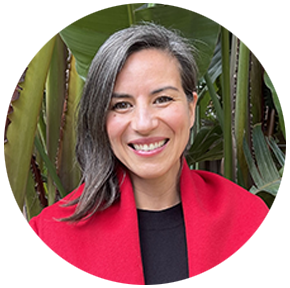 Dear Farmhouse Montessori Families,
Dear Farmhouse Montessori Families,
Mixed-age groups are a hallmark of the Montessori approach. As we settle into Term 1, it has been a delight to observe older children supporting younger children in each classroom, from offering to walk a friend into the school at morning drop-off who might have been hesitant to walk in to providing a word of encouragement or demonstrating how to do something in the classroom. Older children who have experienced one or two years in a three-year cycle assist other children in the school from a place of authenticity. They remember how they felt when they first had to say goodbye to their parents at the front door or how to persist in a challenging task that they can easily do now. Having our students take initiative from a place of genuine care is heartwarming to see.
International Women’s Day & Leadership Summit
In the lead-up to International Women’s Day (March 8th), our Upper Primary girls in Yani attended the Fearless Futures Summit hosted by the Institute of Deeper Learning. This one-day event focused on leadership skills and wellbeing in a supportive environment while engaging with experienced mentors. The summit provided the opportunity to interact with primary students from other schools and to problem-solve in small groups, including a Lego Serious Play challenge. Over 50 leadership qualities were revealed throughout the day and highlighted the necessity of developing individual and collective attributes and the importance of ongoing wellbeing. Reflections and resources from the summit will be shared with all of our primary-aged students.
School Events
We have an upcoming parent mixer and information evening on Thursday, April 4th. The evening starts with the parent mixer at 6:30 pm, followed by an information session on Montessori in the Home at 7:30 pm. All Farmhouse Montessori School parents and carers are welcome to attend. This first combined campus mixer will be held at the North Balgowlah Campus. Kindly refer to the flyer in the newsletter or your emails for further information. We hope to see you there.
Primary Campus Tours
Many of our preschool families have shown interest in visiting the North Head Campus for a school tour, especially to see our classrooms in action in preparation for the primary years. All families are welcome; email enrolments@farmhousemontessori.nsw.edu.au to book a private tour or observation.
Social Media
If you have yet to like our social media pages, follow us on Facebook and Instagram.
Kind regards,
Alia James | Principal
Primary School Coordinator’s Message

Dear Farmhouse Montessori Families,
The Burst into Reading
One of my favourite parts about working with Stage 2 children is the opportunity to work with children who are rapidly developing their reading skills. The Montessori environment is set up for overwhelming success in this area. Let’s take a look.
Sounds first
Long before the science of reading was developed, Maria Montessori identified that the key to reading is for the children to learn the sounds of the English language then match those sounds to the letter symbols. There are 44 sounds in the English language and we begin with the consonant and short vowel sounds. We pay particular attention to how the child articulates each sound so that sounding out short words is an exciting next step.
Sight words categorised by sounds
In the English language there are certain words that appear more often than others so it can be helpful for the children to be able to read them very quickly. Traditionally these words are taught relying on memorisation because certain words are introduced before the children know how to sound them out. To help with this, we have the sight words arranged so that the children learn them in an order that corresponds with their knowledge of letter sounds. This makes learning to read both very achievable and enjoyable.
Decodable readers
You’ve already had your child bring home a reader from school. These readers are phonetically controlled so they contain only the words that have sounds the children are familiar with. They are an excellent resource for your child to experience the joy of reading a real book early in their reading journey. We hope you’re enjoying the opportunity to share this experience with them.
Phonetic spelling
Because the English language has different symbols for the same sound we know that children won’t always use the correct one. For instance, before children learn about magic ‘e’ they might spell ‘came’ using only ‘cam’. Once the child has learned about magic ‘e’ during the year, we give them reminders about using that knowledge in their writing.
Chris Deery | Primary School Coordinator
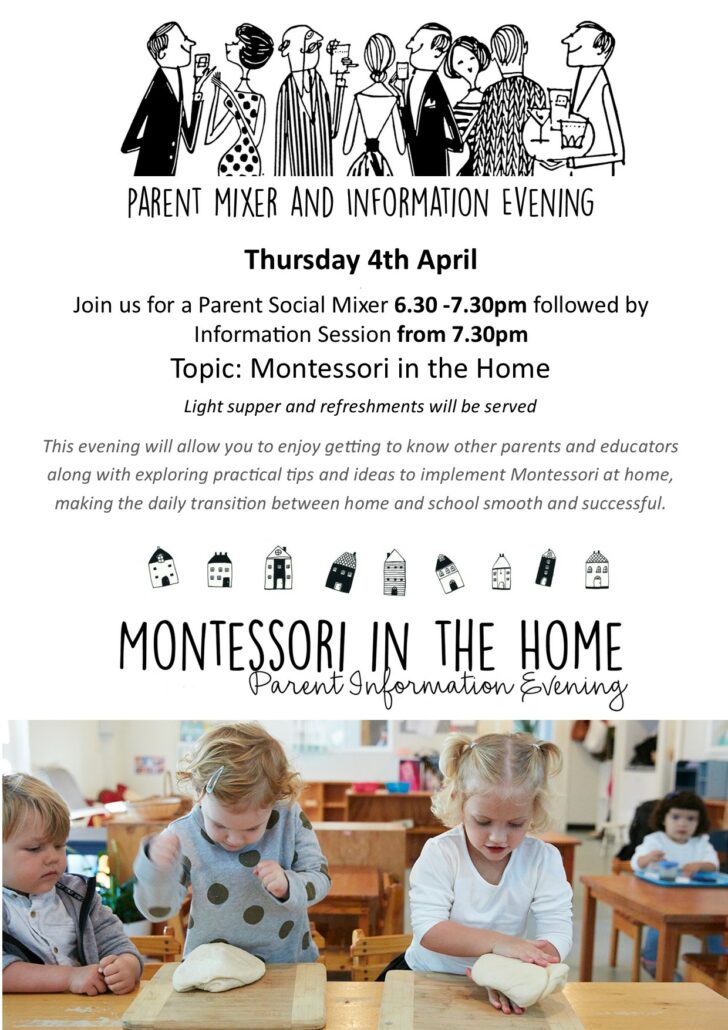
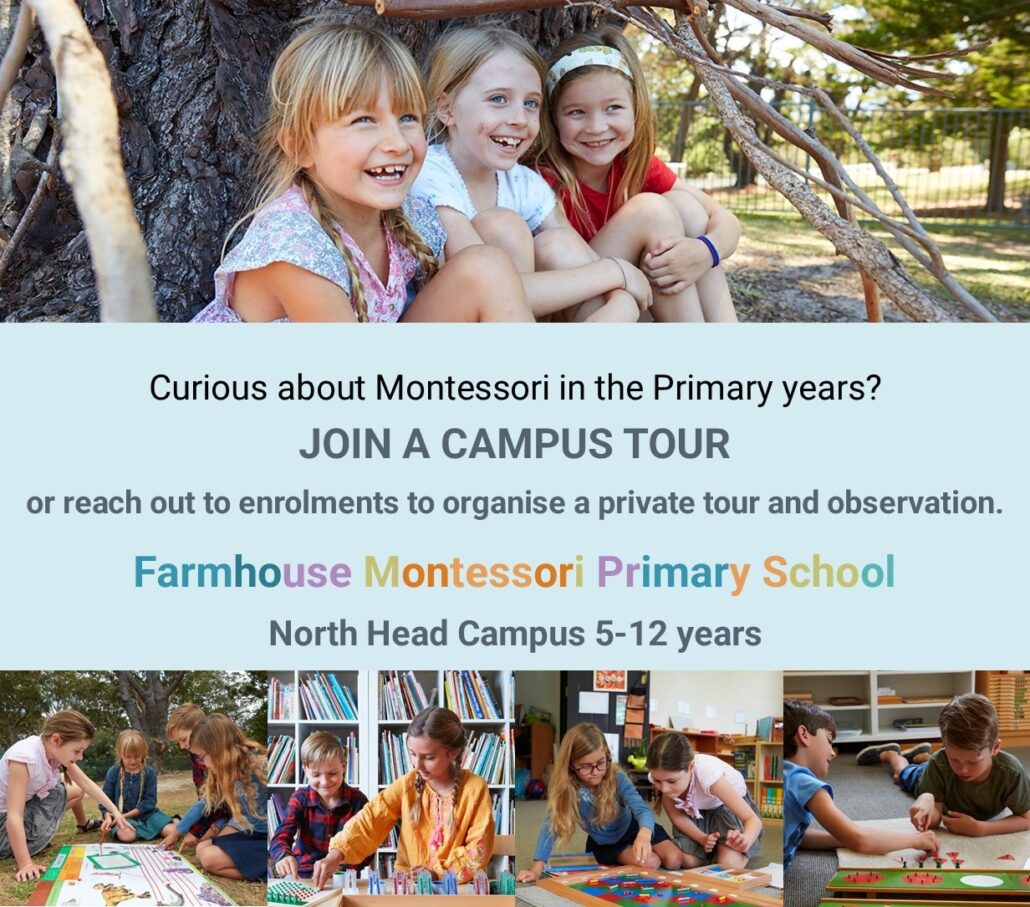
ELOUERA | Stage 1 Infant Community
To the toddler the everyday tasks, that we as adults often see as mundane, are exciting and joyful challenges. Tasks that we often complete without thinking provide the child opportunities for developing their fine motor control and coordination, independence, concentration, and a sense of responsibility. Maria Montessori called these activities ‘practical life’. In the Elouera classroom we have a wide variety of practical life work that the children can choose to complete each day. Bread baking, dish washing, plant watering, flower arranging, cloth folding, fruit washing, and food preparation activities are just some of the exciting, purposeful activities that are a part of the ‘real world’ and are empowering for our toddlers to master.
— Corinne, Anniebelle, Nina, Sarah.
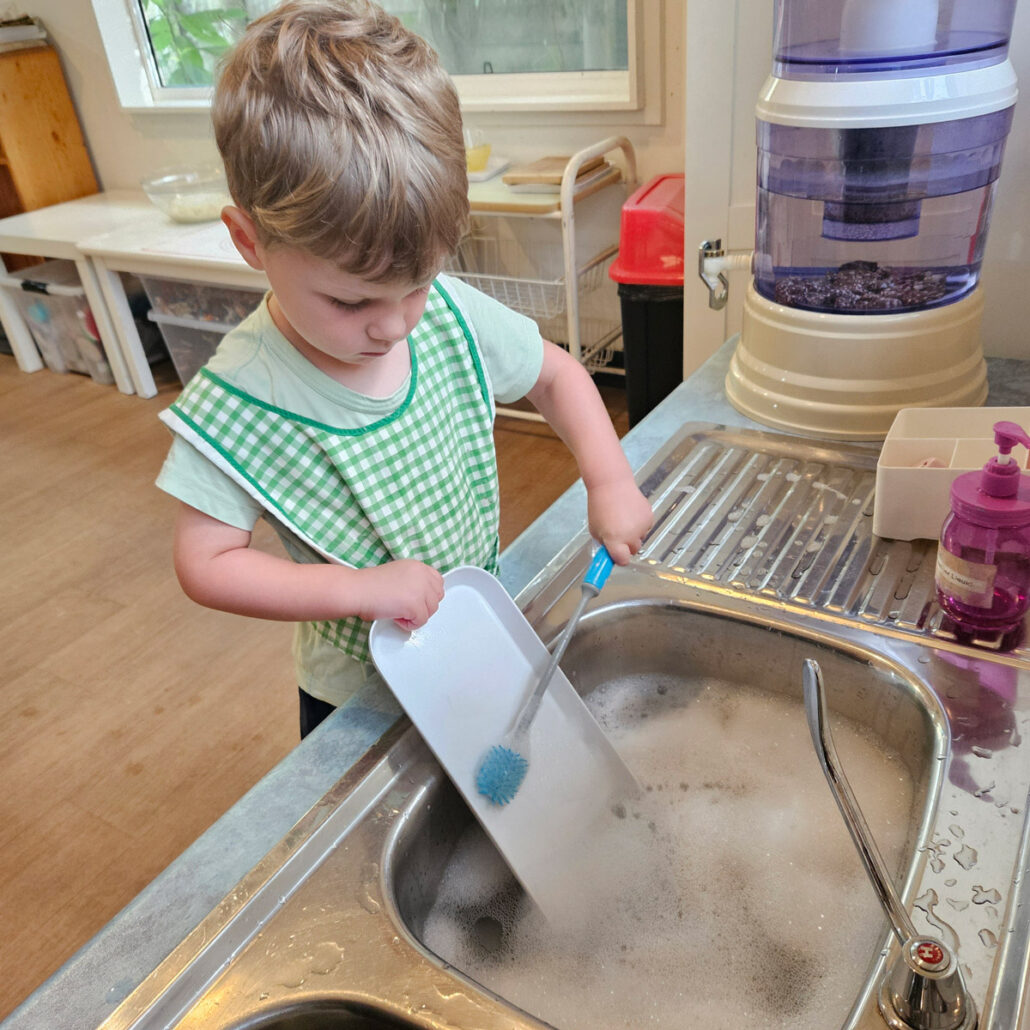
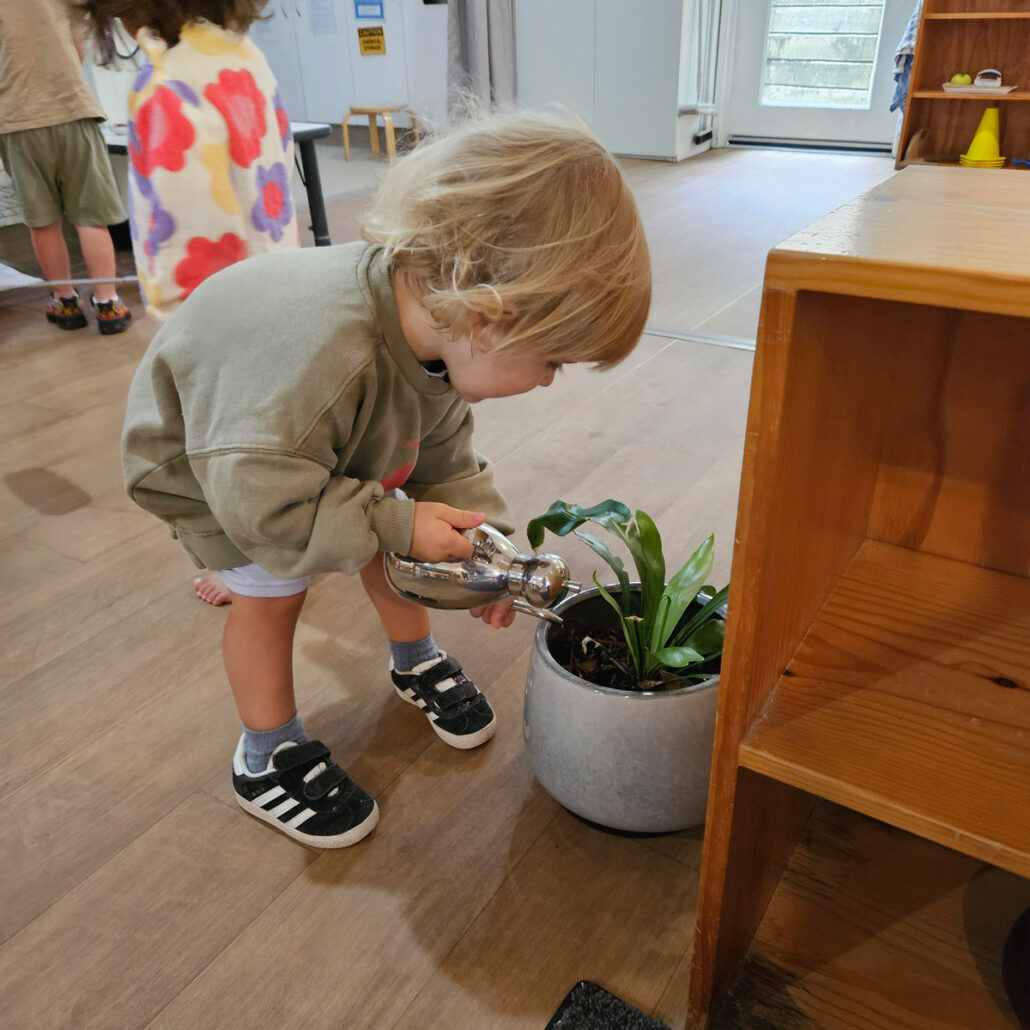
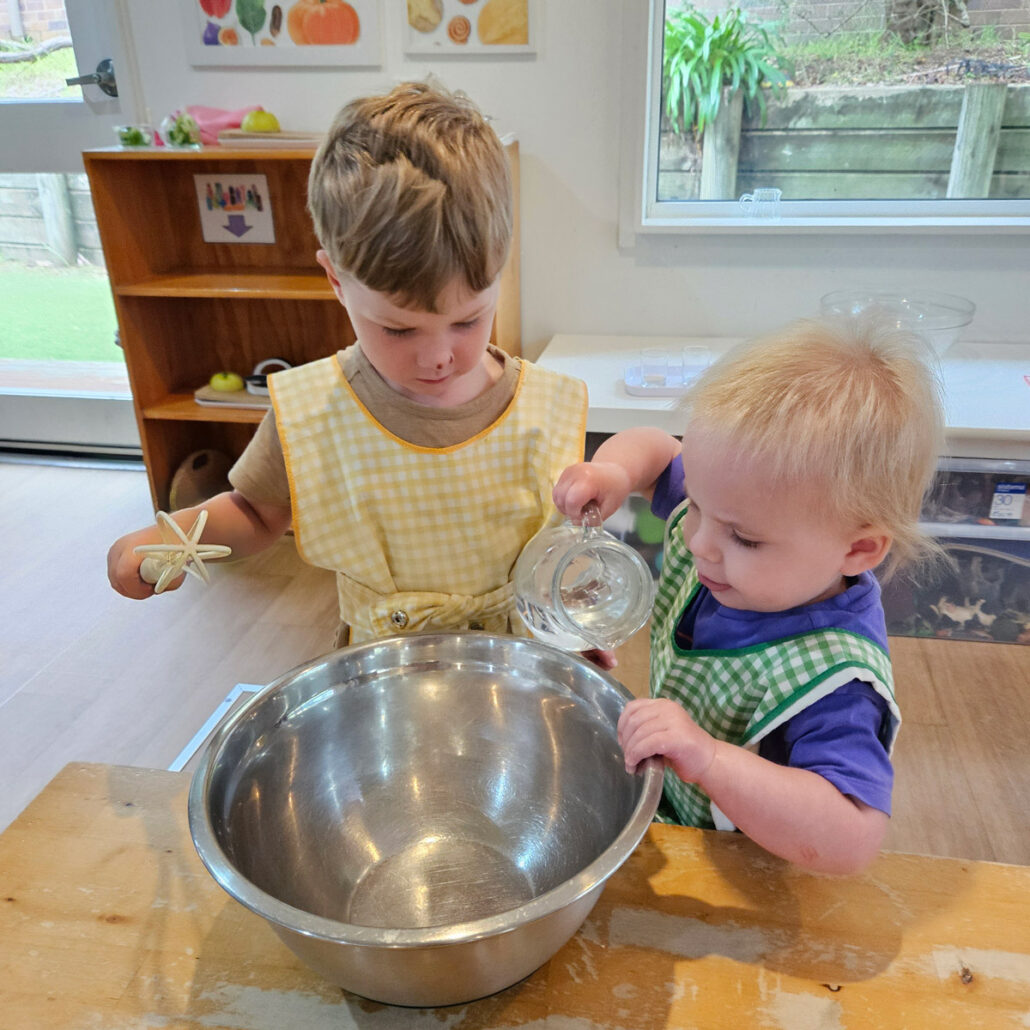
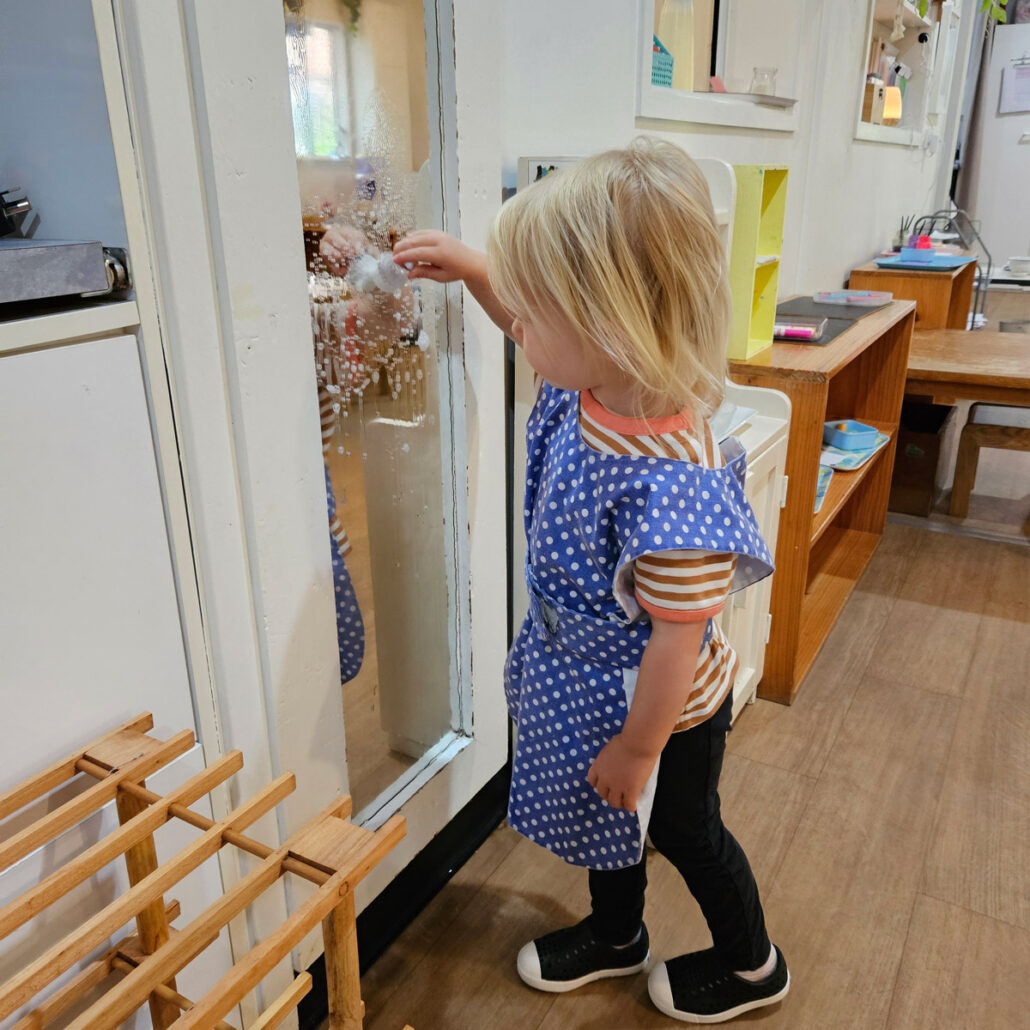
BURBANGANA | Stage 1
This week, we embarked on a journey to understand the incredible functions of our skin. Through interactive activities and discussions, the children learned how these essential parts of our bodies work together to help us move, feel, and interact with the world around us.
Through fun and engaging experiments, such as clapping hands, rubbing different textures, and feeling the temperature of water, the children discovered just how incredible our sense of touch truly is. We identified warm, cool, and cold sensations and explored the various textures of materials—all while closing our eyes and relying solely on our sense of touch! We had a blast exploring the unique patterns of our fingerprints through painting and printing our fingerprints on clay impressions. Each fingerprint telling its own story, showcasing the beauty of our individuality! We also had the pleasure of making and savouring some delicious chamomile tea. From the fragrance of the tea leaves to the warmth of the cup in our hands, it was a delightful sensory journey for us all.
— Kathleen, Teresa, Katherine and Yuko.
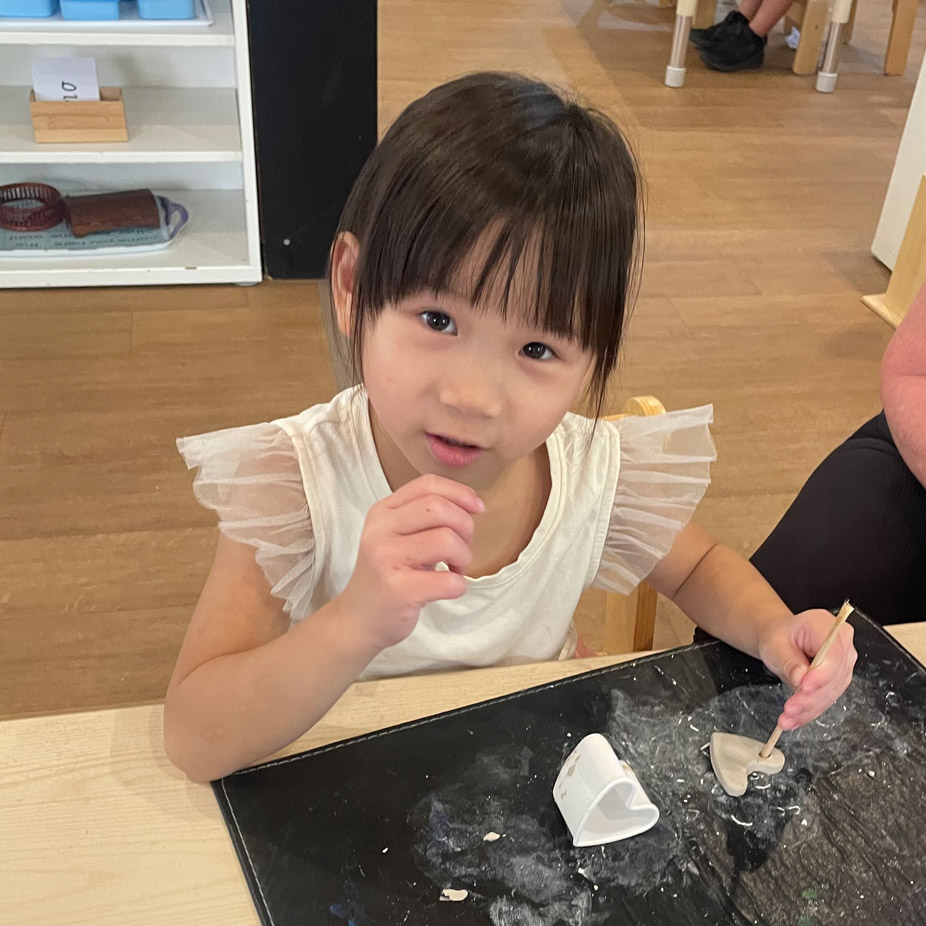
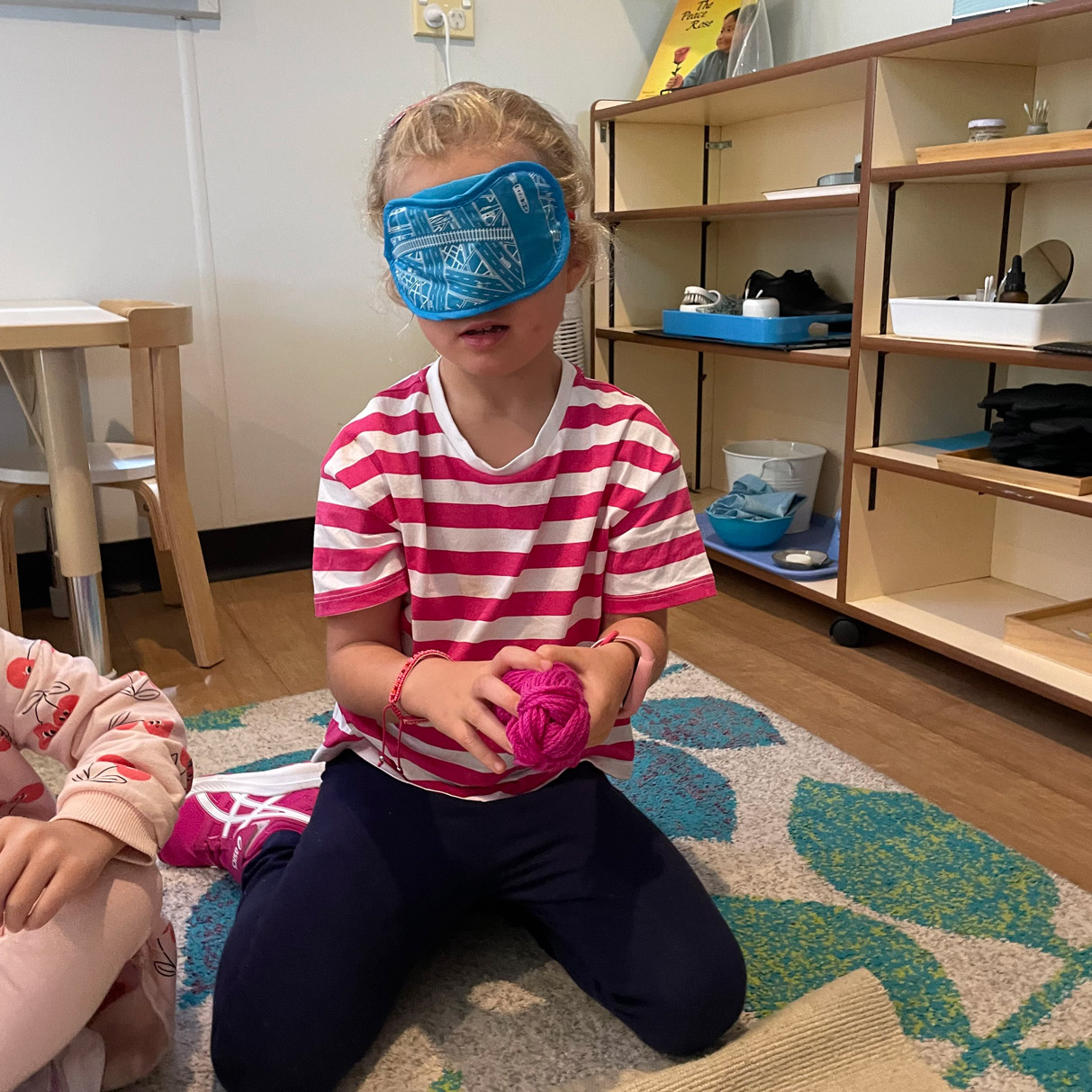
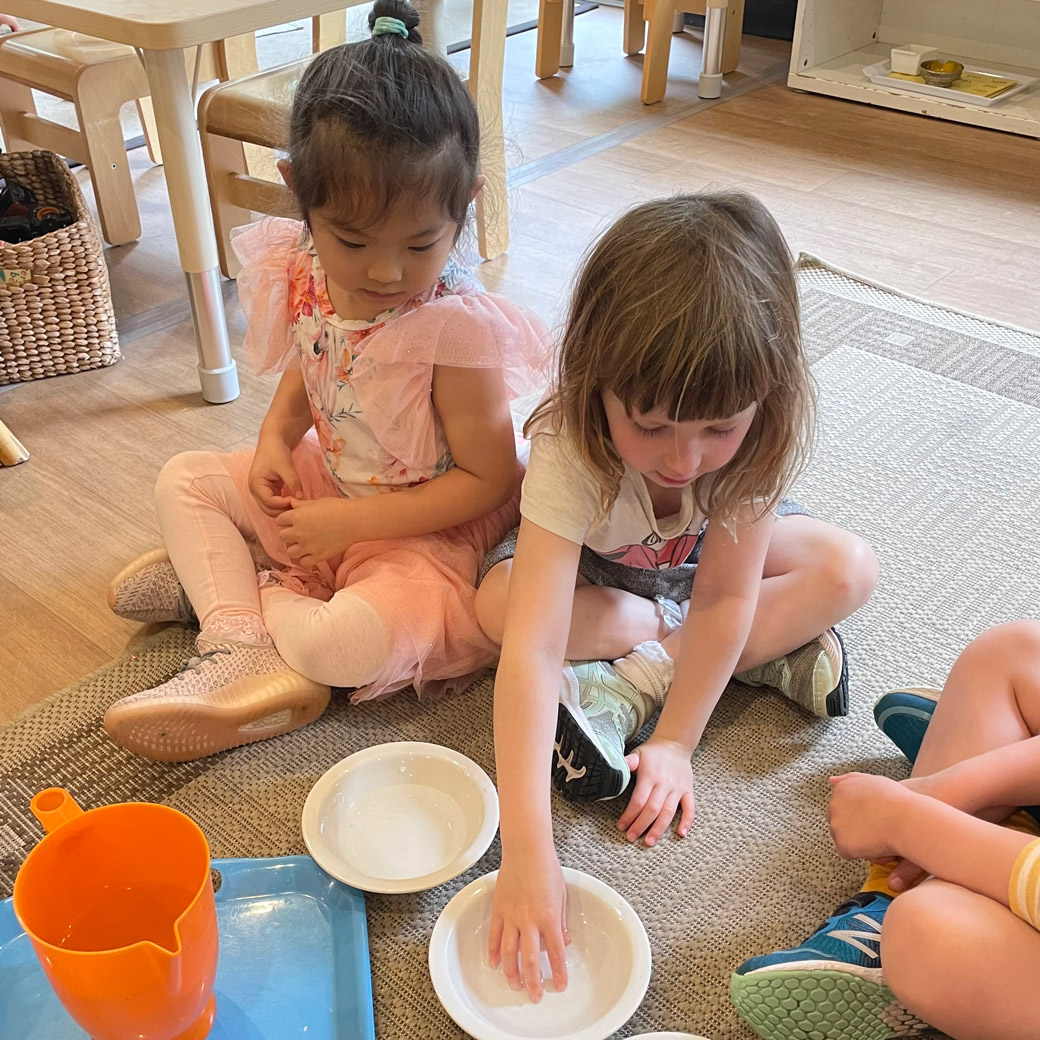
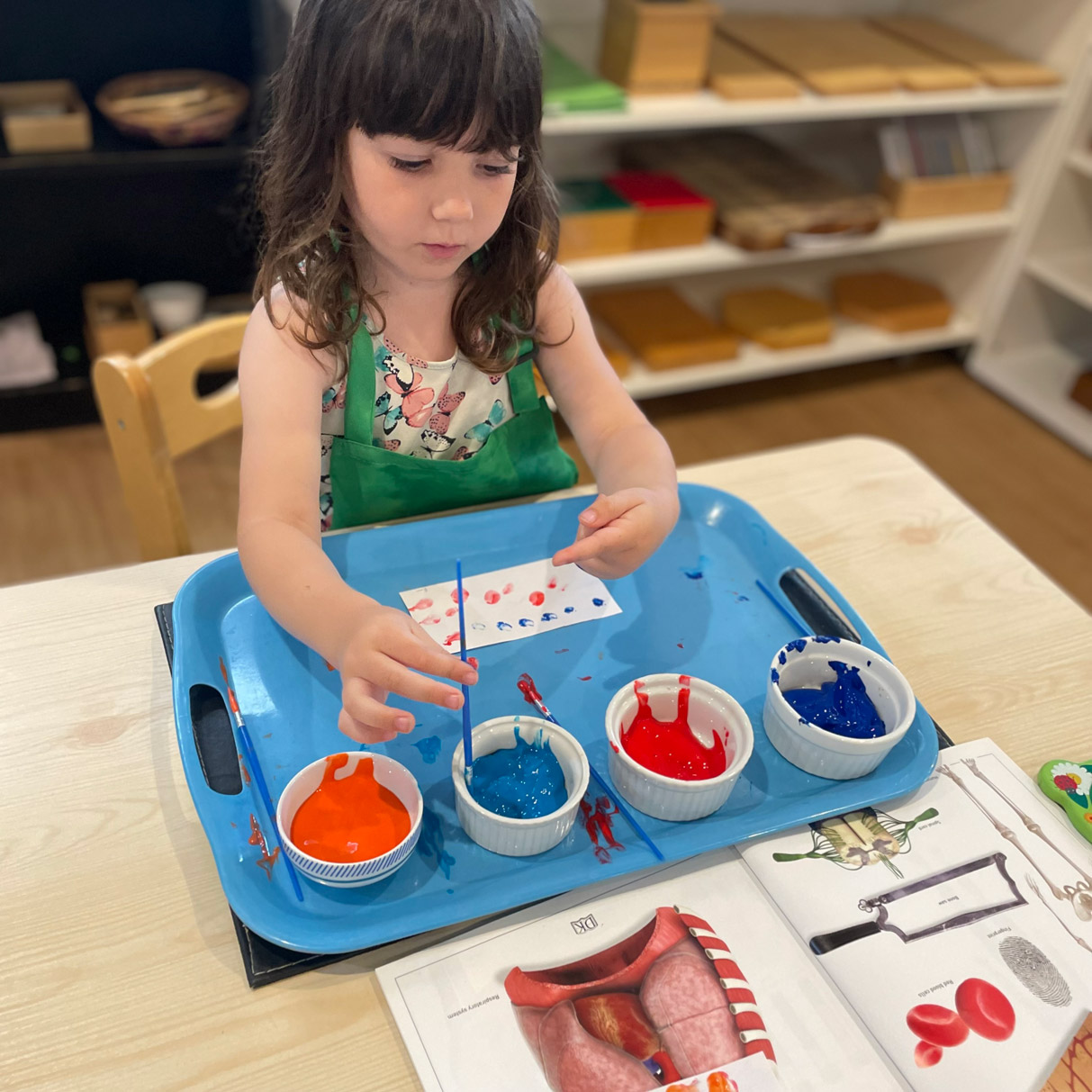
COOINDA | Stage 1
Sensorial materials in a Montessori environment are designed to engage multiple senses, allowing children to explore concepts through hands-on experience. By manipulating these materials, children develop their problem-solving skills in several ways, for example as children engage in trial-and-error activities with sensorial materials they experiment different approaches to achieve desired outcomes. Through this process, they learn to assess situations, make decisions, and adapt their strategies accordingly—a crucial aspect of problem-solving.
Through the hands-on exploration of sensorial materials in a Montessori environment the children build a strong foundation for developing problem-solving skills by fostering sensory awareness, critical thinking, experimentation, and independence.
—Harshitha, Catalina, Jo, Rachel, Claire & Angela.
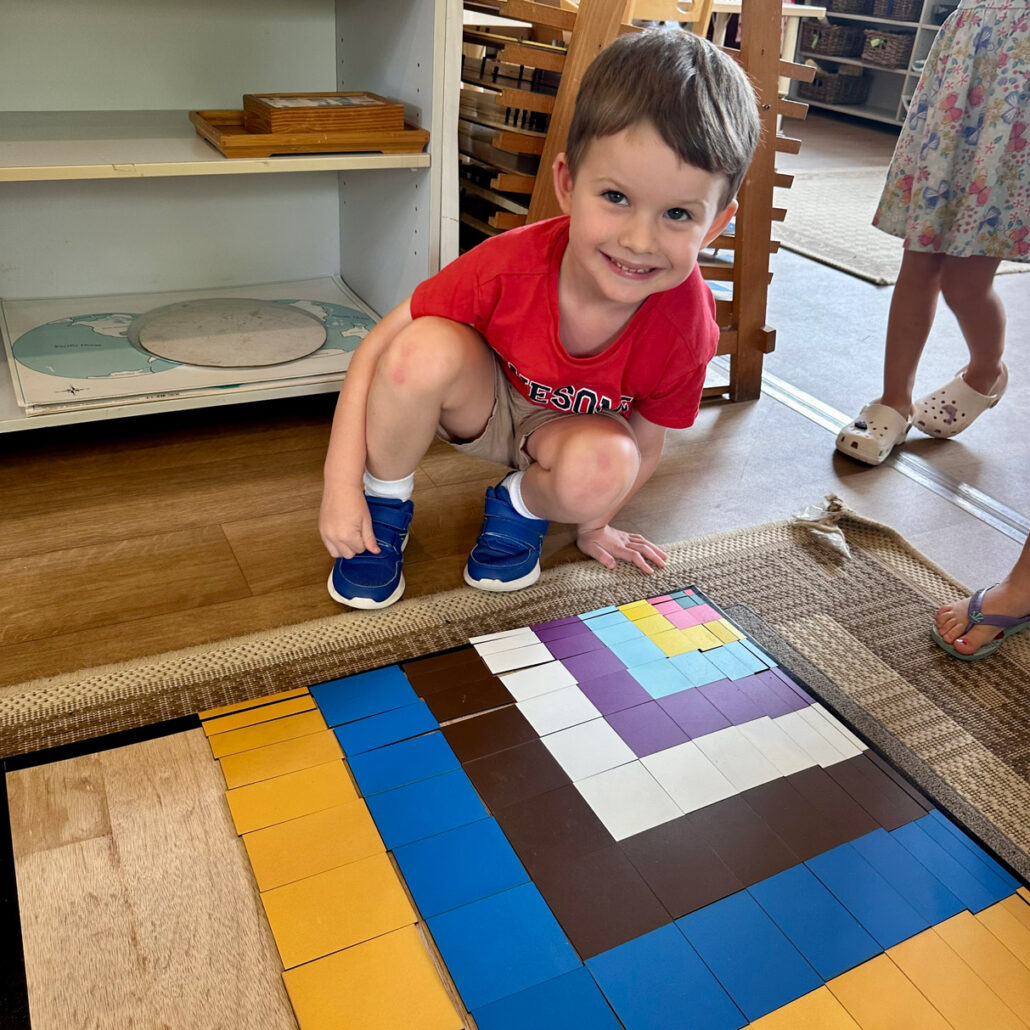
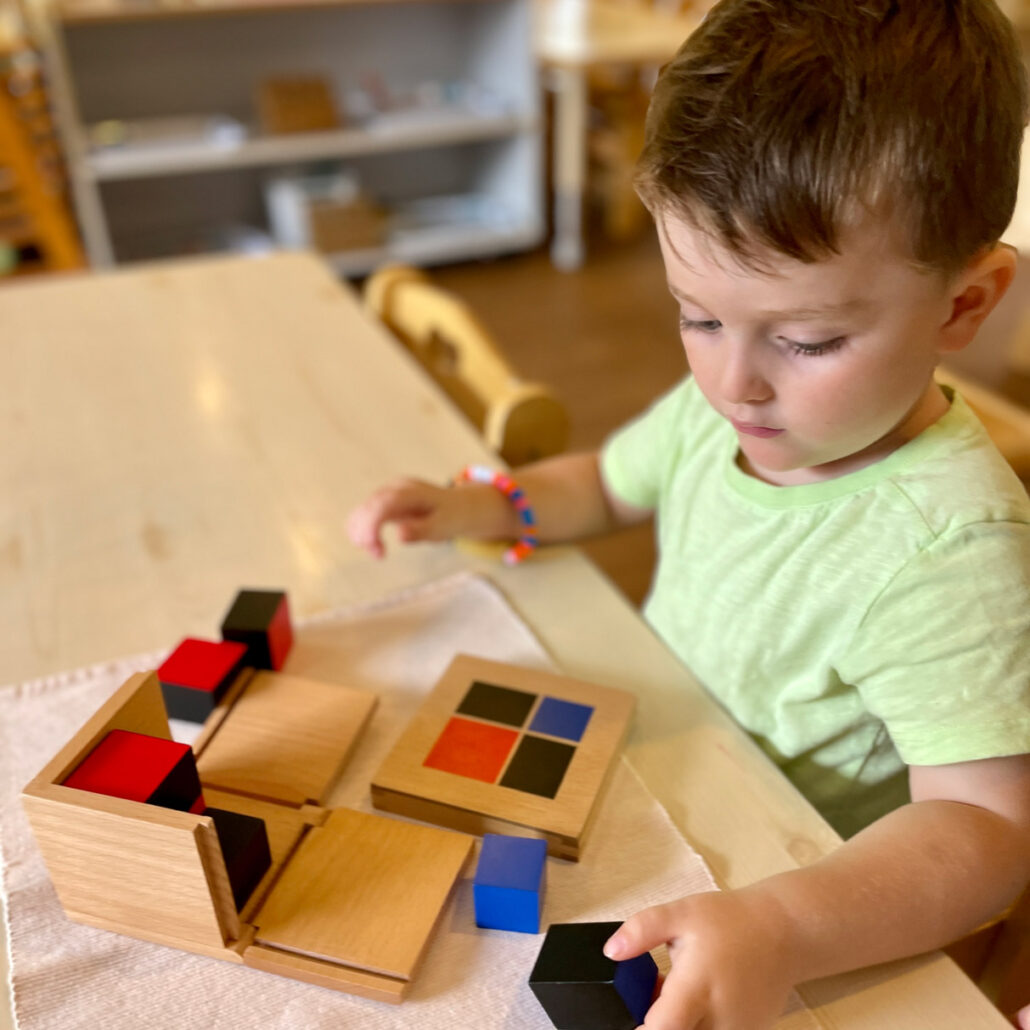
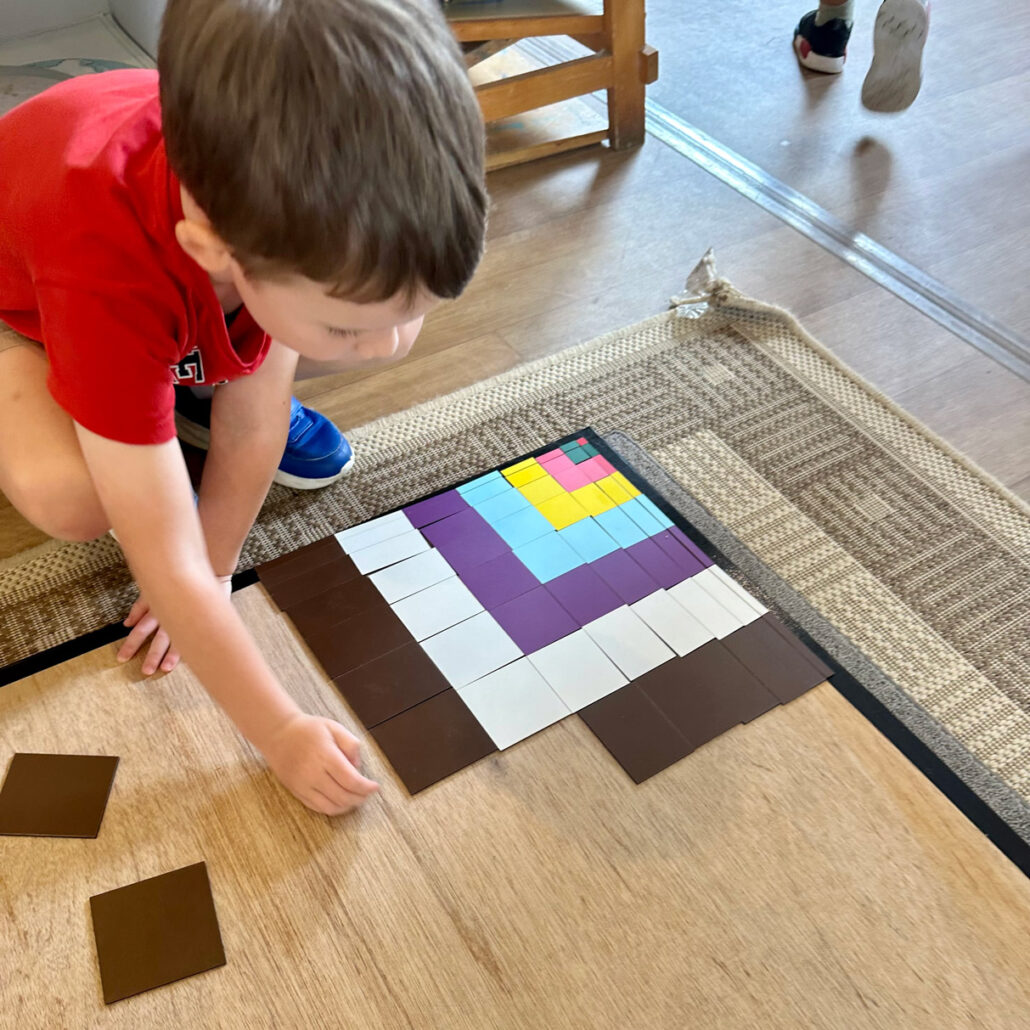
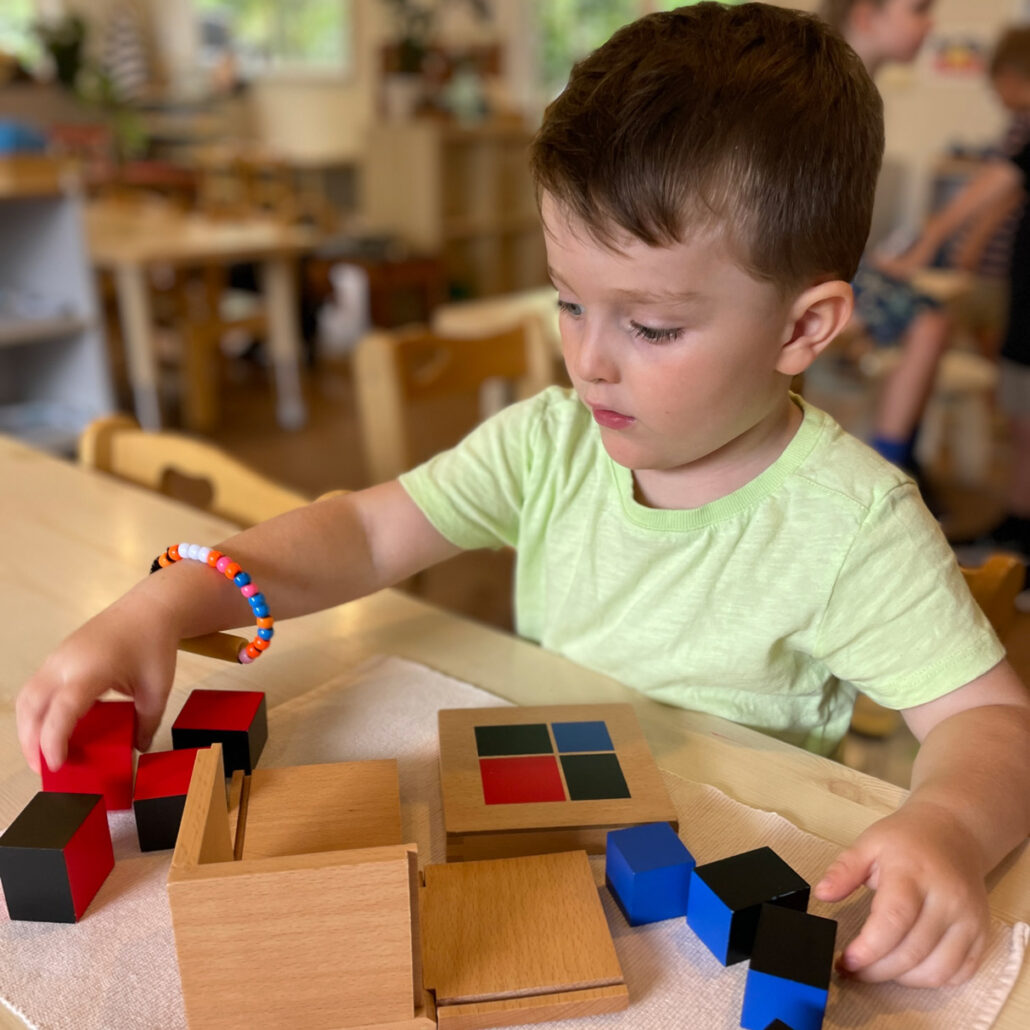
AMAROO | OUTDOOR CLASSROOM
Montessori 3 part cards are used to enrich a child’s language skills, grow their vocabulary, develop their classification, reading and writing skills and their knowledge of the world around them. They are an essential tool in the outdoor classroom as they can be used in so many ways. They consist of a picture card eg a type of shark, a label or word card and a control card. Children can work with them alone or in groups taking turns to choose a card and then match the picture and the label.
To reinforce the learning and just for fun we also use the cards in memory games, this week children chose to extend themselves and make their own sea creatures cards as a game to take home. Others take inspiration in making booklets or posters of their own drawings and to practise their writing.
There are endless opportunities to learn in this way from types of insects to famous landmarks, or deep sea creatures to types of vegetables!
– Dawn
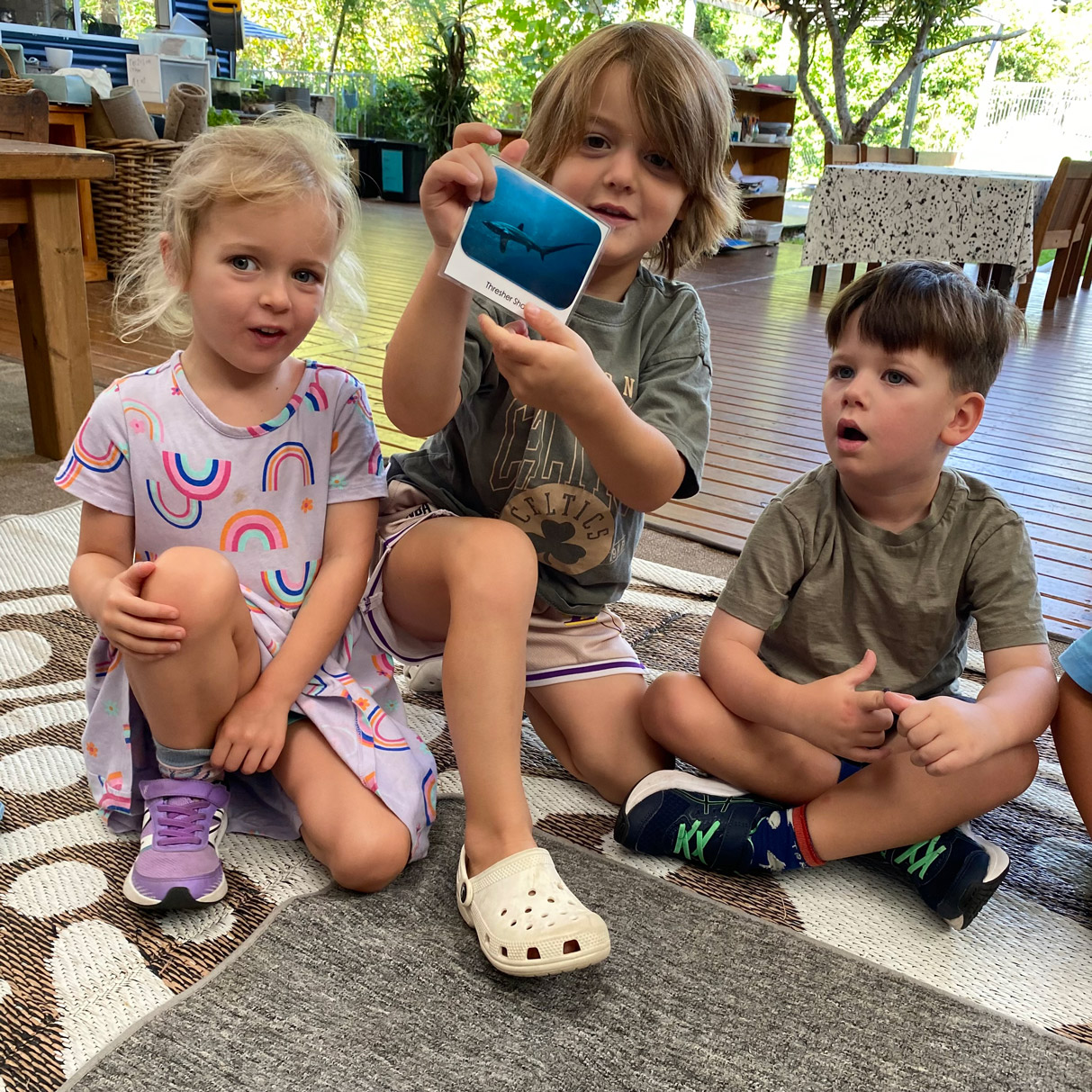
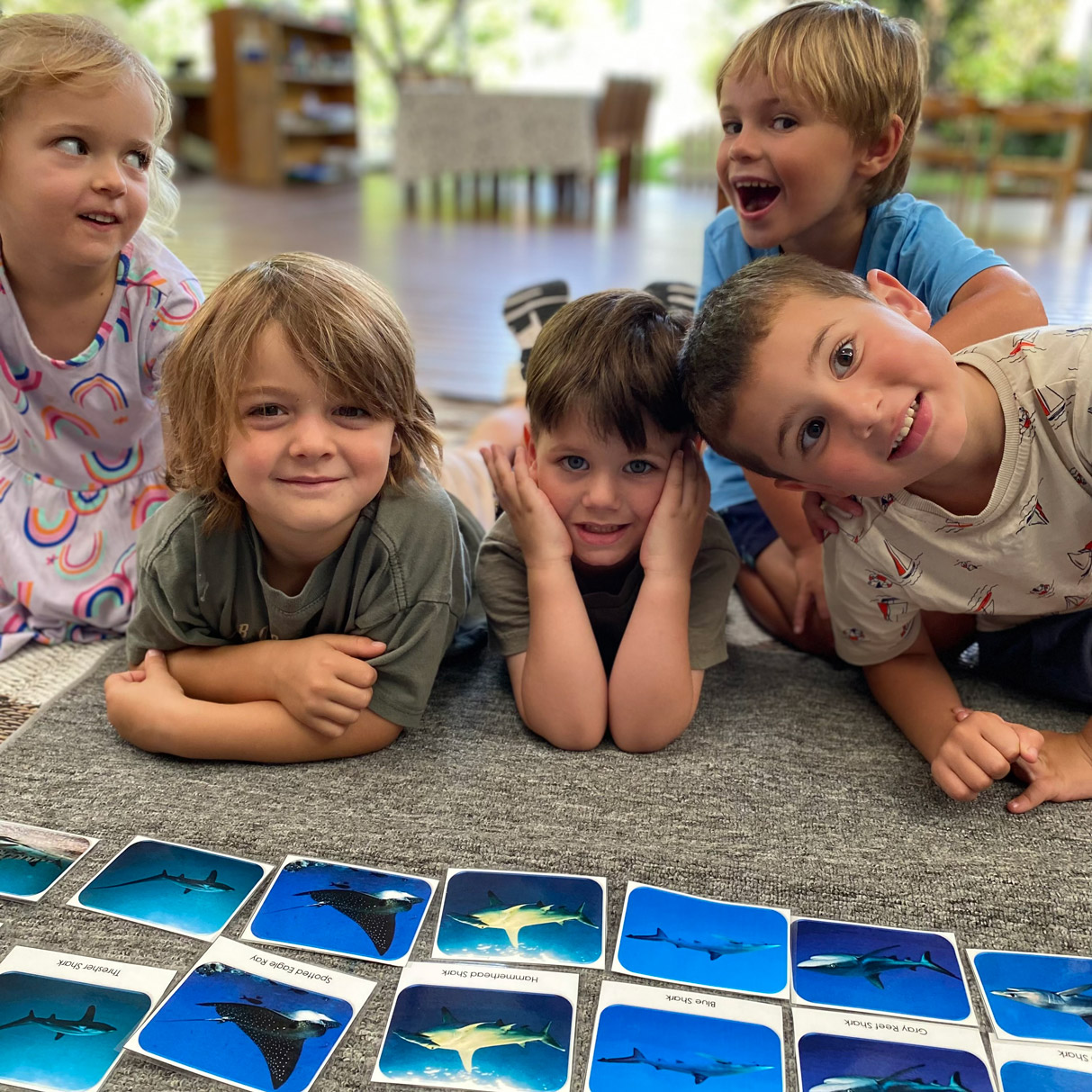
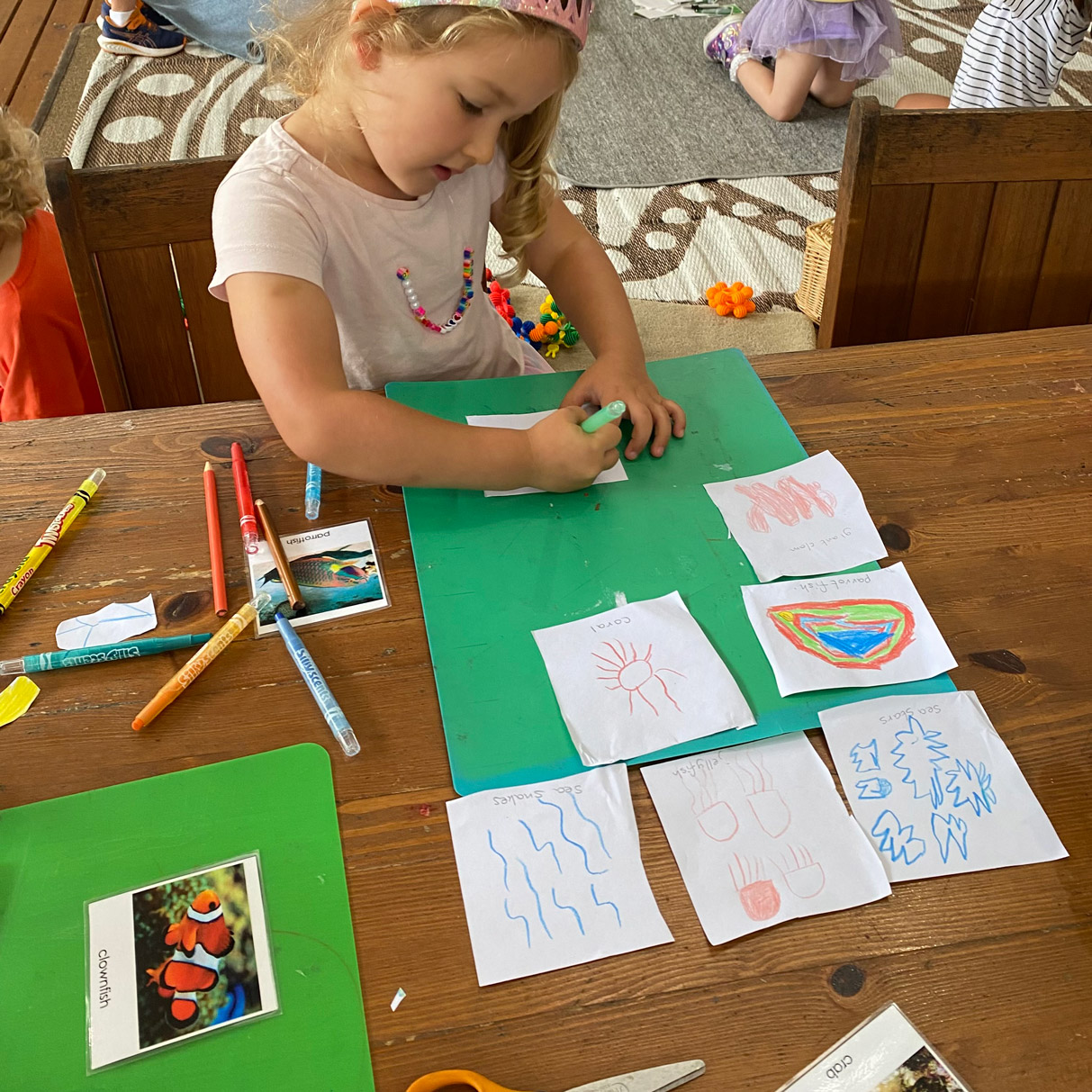
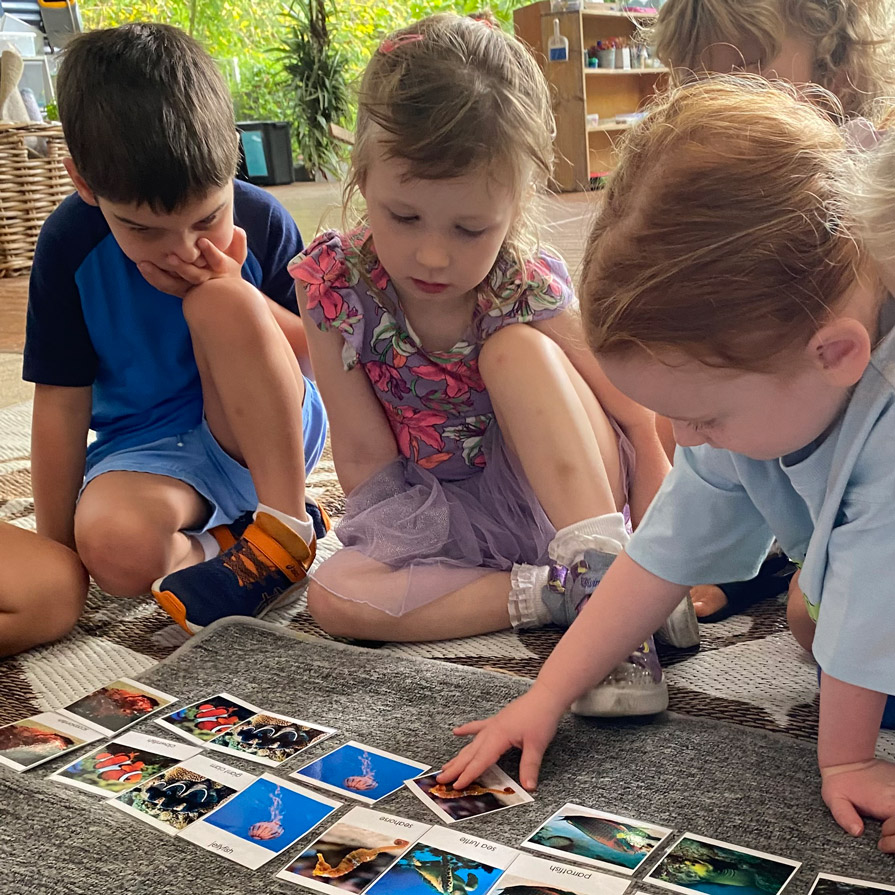
AIKYA | Stage 2
These past two weeks have been filled with exploration, discovery, and joyful learning as we delved into the wonders of the Montessori Second Great Lesson.
Montessori Second Great Lesson: The Story Unveiled
In our journey through the Montessori Second Great Lesson, we uncovered the fascinating tale of Earth’s evolution and the interconnected web of life. The children were captivated by the narrative, understanding the key aspects of this incredible journey that has shaped our planet.
Focus Lessons: Exploring the Animal and Plant Kingdoms
Following the Second Great Lesson, we immersed ourselves in focused lessons that brought the story to life. Our young minds eagerly engaged in exploring the Animal Kingdom, delving into the classification of invertebrates and vertebrates. Additionally, a horizontal study within the Animal Kingdom Phylum provided a deeper understanding of the diversity within this fascinating realm.
Turning our attention to the plant kingdom, we embarked on a similar journey of evolution and classification. The children explored the intricate patterns of Earth’s Biomes, understanding how specific climates and weather patterns have influenced the evolution of plants and wildlife in these diverse areas.
The Artistry of Poetry in Aikya
Poetry has taken centre stage during our group times at Aikya. The children have been actively participating in poetry recitals, finding joy in memorisation, recitation, and the artistic expression of verse and rhyme. Beyond the creative aspect, practising poetry has proven to be a valuable learning tool, enhancing language skills, fostering creativity, and encouraging self-expression.
Looking Ahead with Optimism and Excitement
As we conclude these two weeks of exploration and learning, we look forward to the continued growth and development of each child in Aikya. As always, we extend our gratitude to the Farmhouse Montessori community for your ongoing support, and we can’t wait to share more exciting adventures.
We wish you happiness, health, and wellbeing.
The Aikya staff and children.
Warmest regards,
—Toby, and Chris and Amy Louise & Ella.
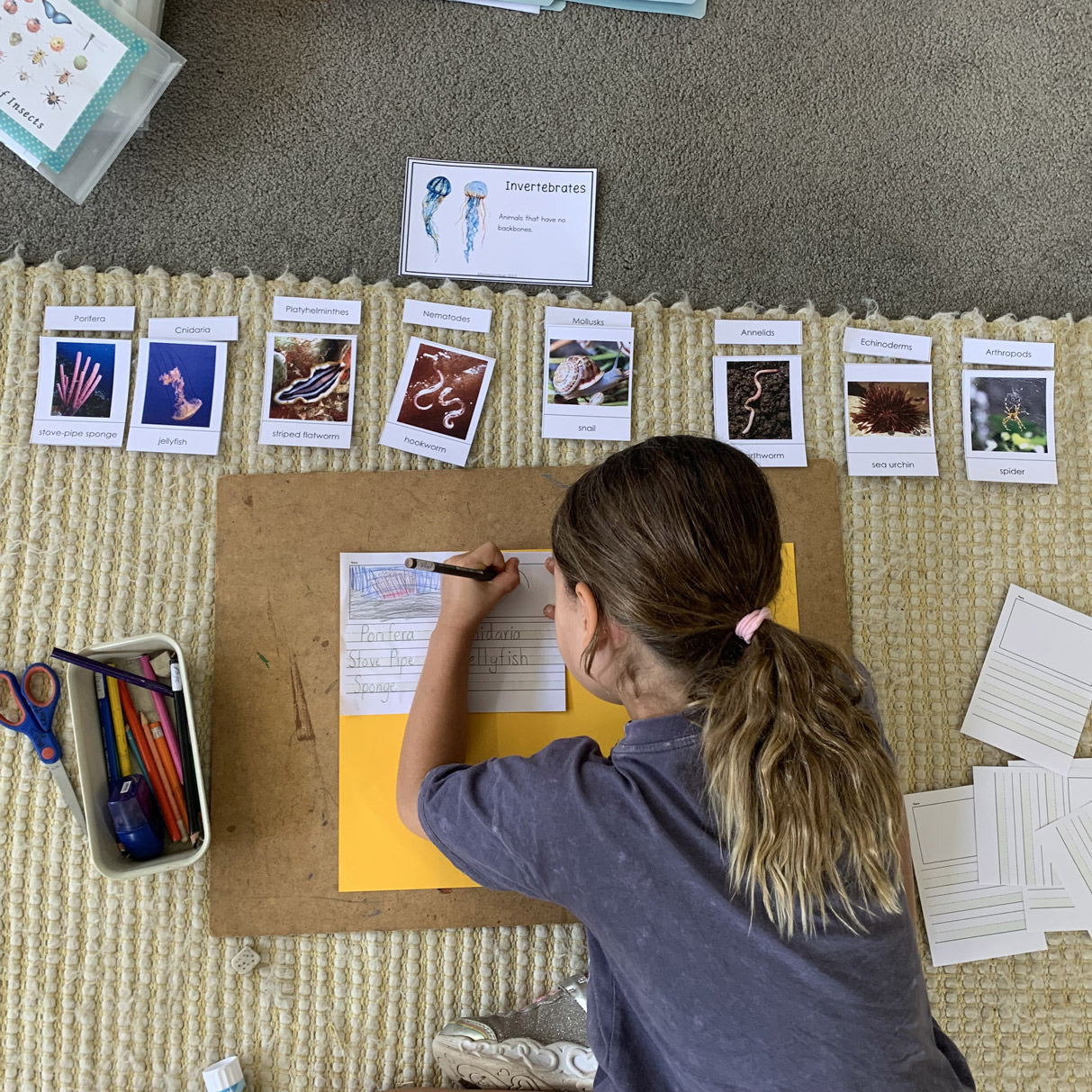
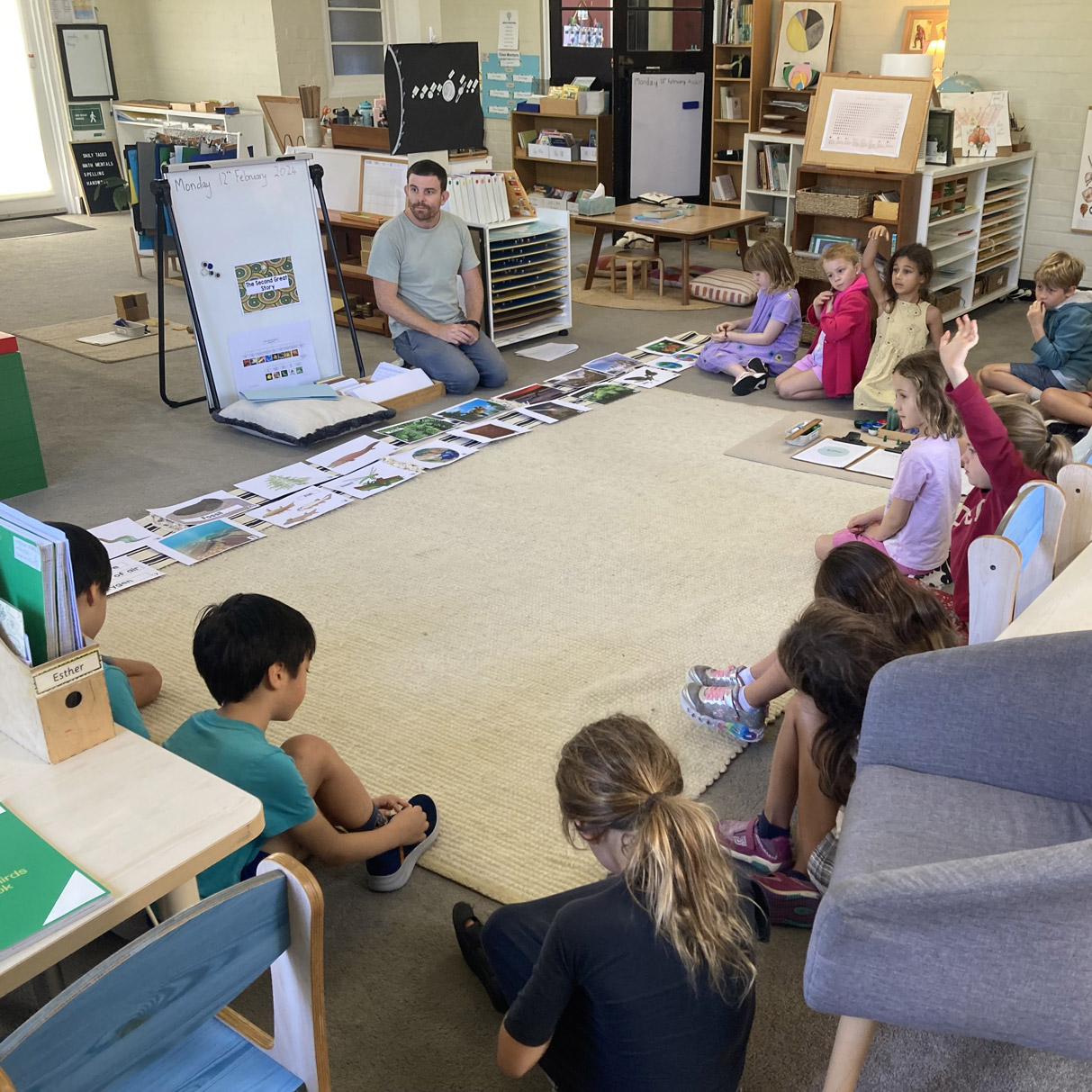
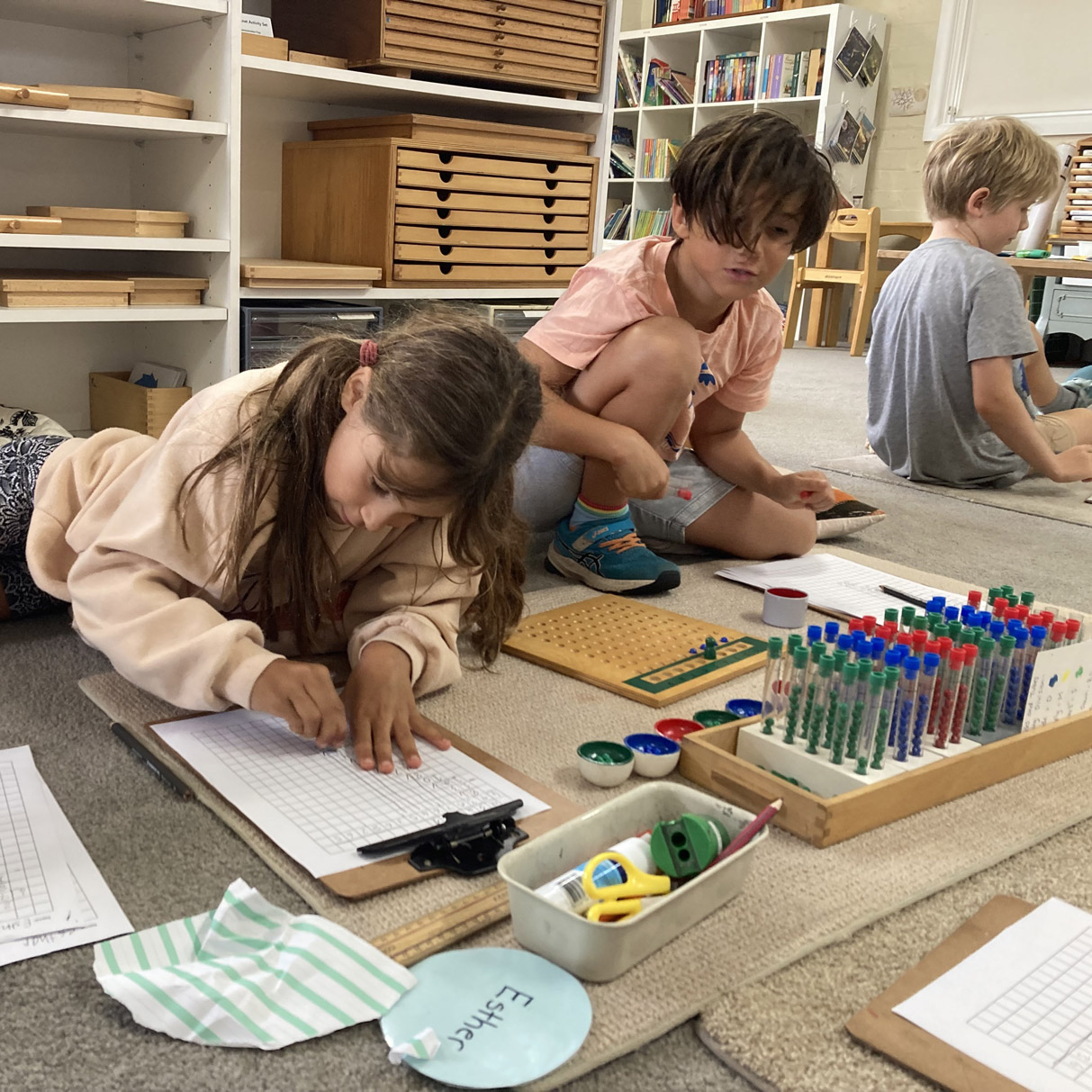
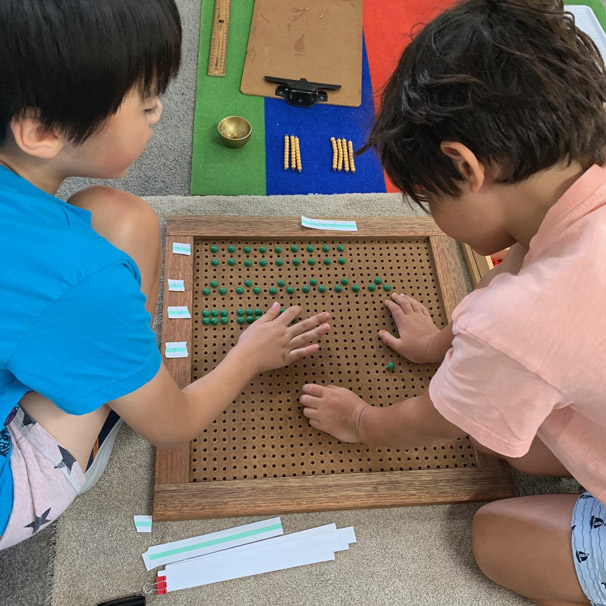
YANI | Stage 3
Over the past two weeks, the children in the Yani classroom have had the opportunity to embark on a journey through the depths of natural history. Their exploration kicked off with a presentation on the Montessori’s second great story: The Coming of Life. Through vivid storytelling and the use of the Timeline of Life and research materials, the students were transported back in time to witness the inspiring evolution of Earth and its diverse array of living organisms over millions of years. They explored the interconnectedness between species and gained a profound understanding of the balance that sustains life on our planet.
Despite the persistent wet weather, the students found joy and excitement indoors during their sports lesson, where they delved into the fascinating history of the Olympic Games. They learned about this global sporting event’s ancient origins and evolution over time. The lesson ended with a lively dance session, where everyone joined in. Additionally,
Antony had the opportunity to present his research project: The Amazing Art of Trees. Filled with intriguing facts about the world’s largest tree and its evolution, Antony’s passion for trees ignited the appreciation of his peers.
In regards to mathematics, students continued using the Montessori materials to gain a deeper understanding of different topics, such as finding the lowest common multiple of a number using the bead chains, or calculating the square of a binomial.
—Laura, Thomas, Ella & Amy Louise.
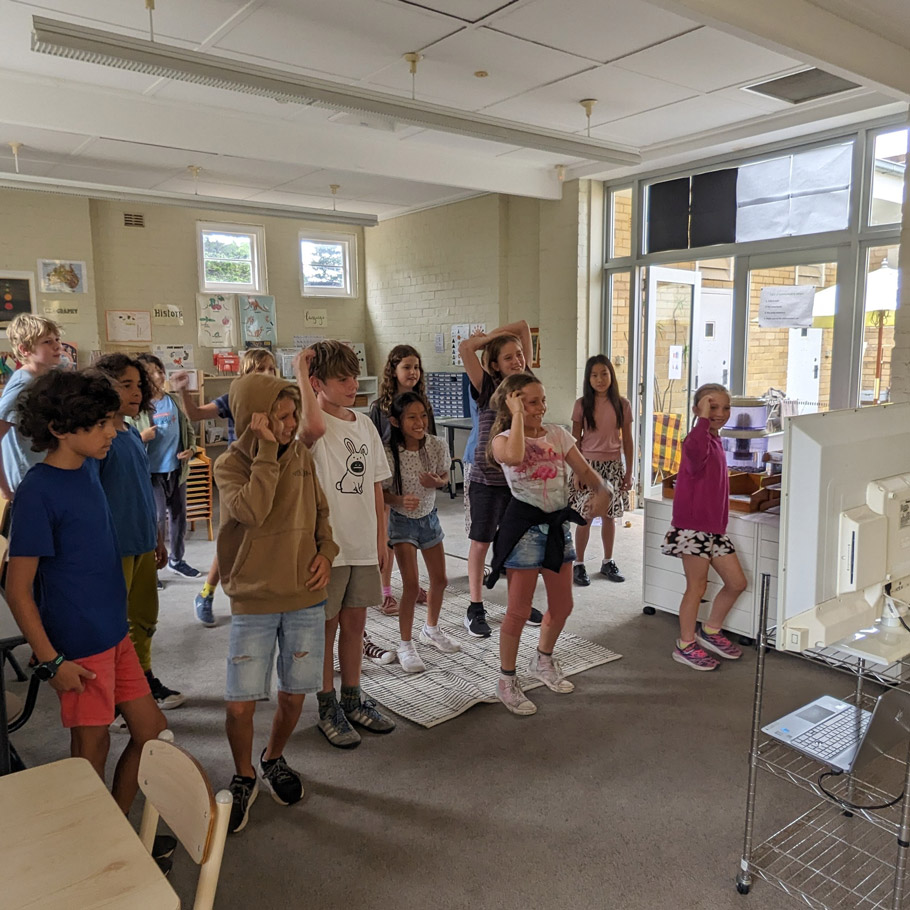
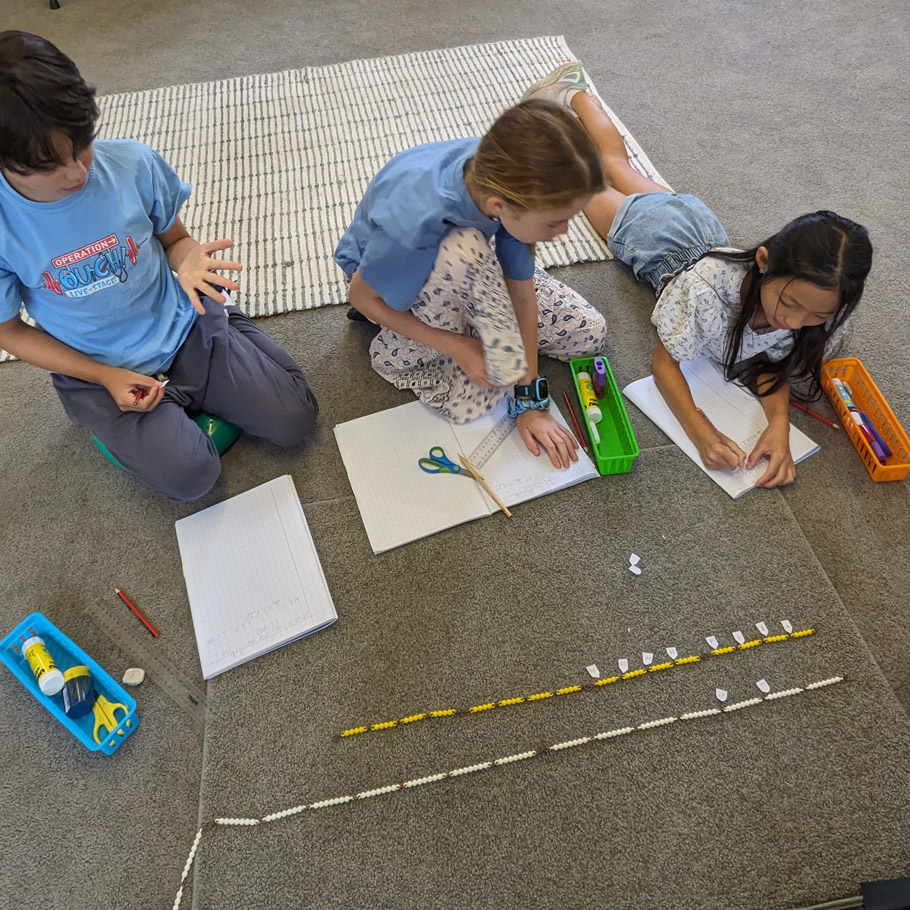
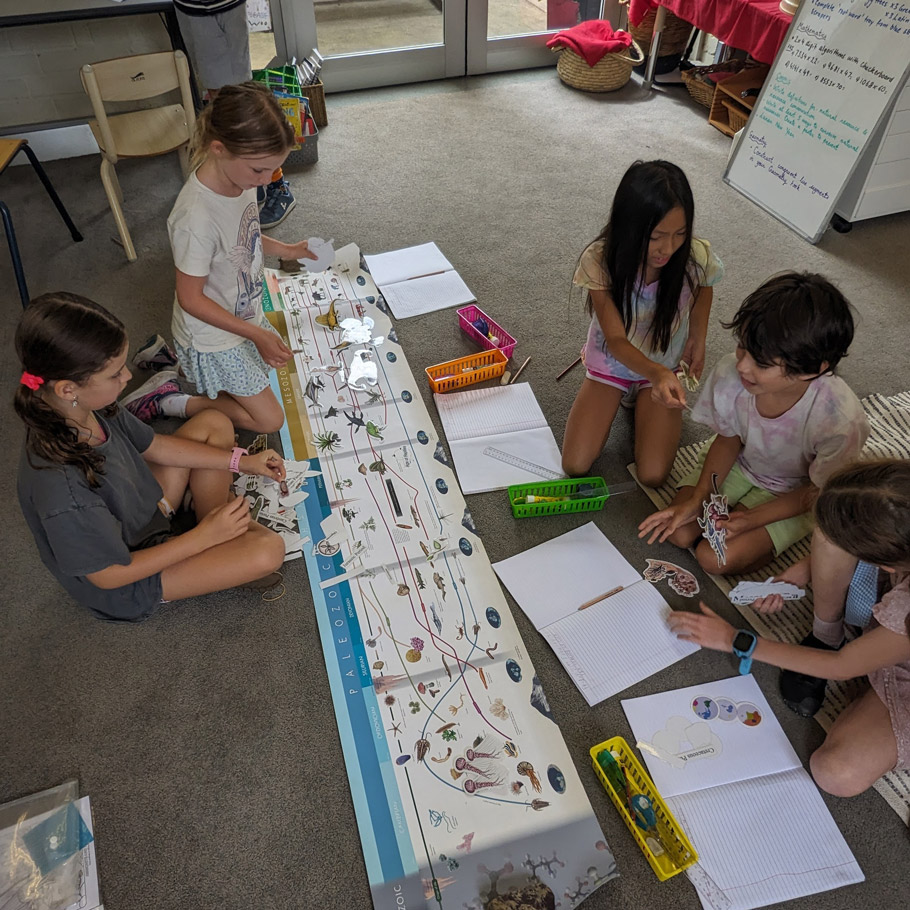
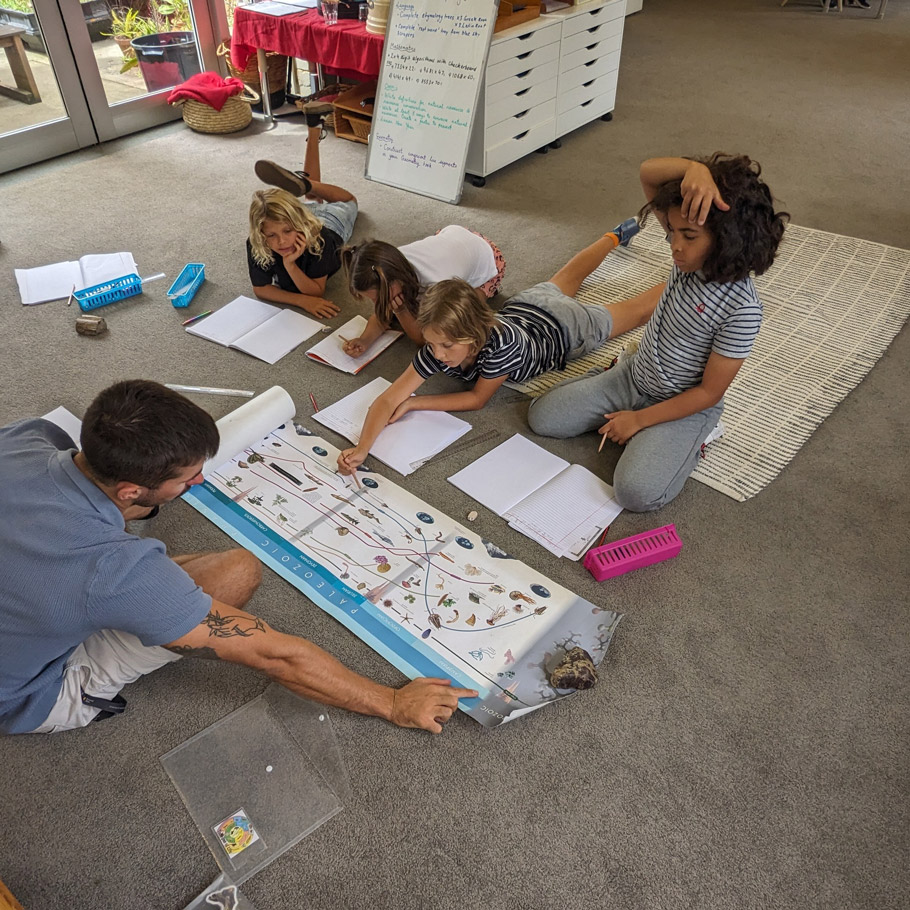
EVERGREEN | Music
North Head Campus
This Term our focus will be on drumming, from understanding the parts of the drum kit, learning drum notation and working with auxiliary percussion as well. Over the last few weeks both classes have been learning to play Latin Claves and working together to create a unified sound. Students have learnt the names of each of the parts of a drum kit, and have been fine tuning how to read and play a rock beat.
Preschool Campus
We’ve loved getting back into music making at North Balgowlah. For all our groups we’re looking at dynamics and creating simple rhythm patterns using fruits. It’s been lots of fun! If families want to get involved at home, there’s an easy activity everyone can do:
– find 2 or 3 different fruits that you have at home (eg Pear / Mango)
– place them in an order (eg Pear / Mango / Pear)
– clap along as you name each fruit (Pear / Man-Go / Pear)
– take turns at changing the order and repeating the clapping game
— The Evergreen Music Team.

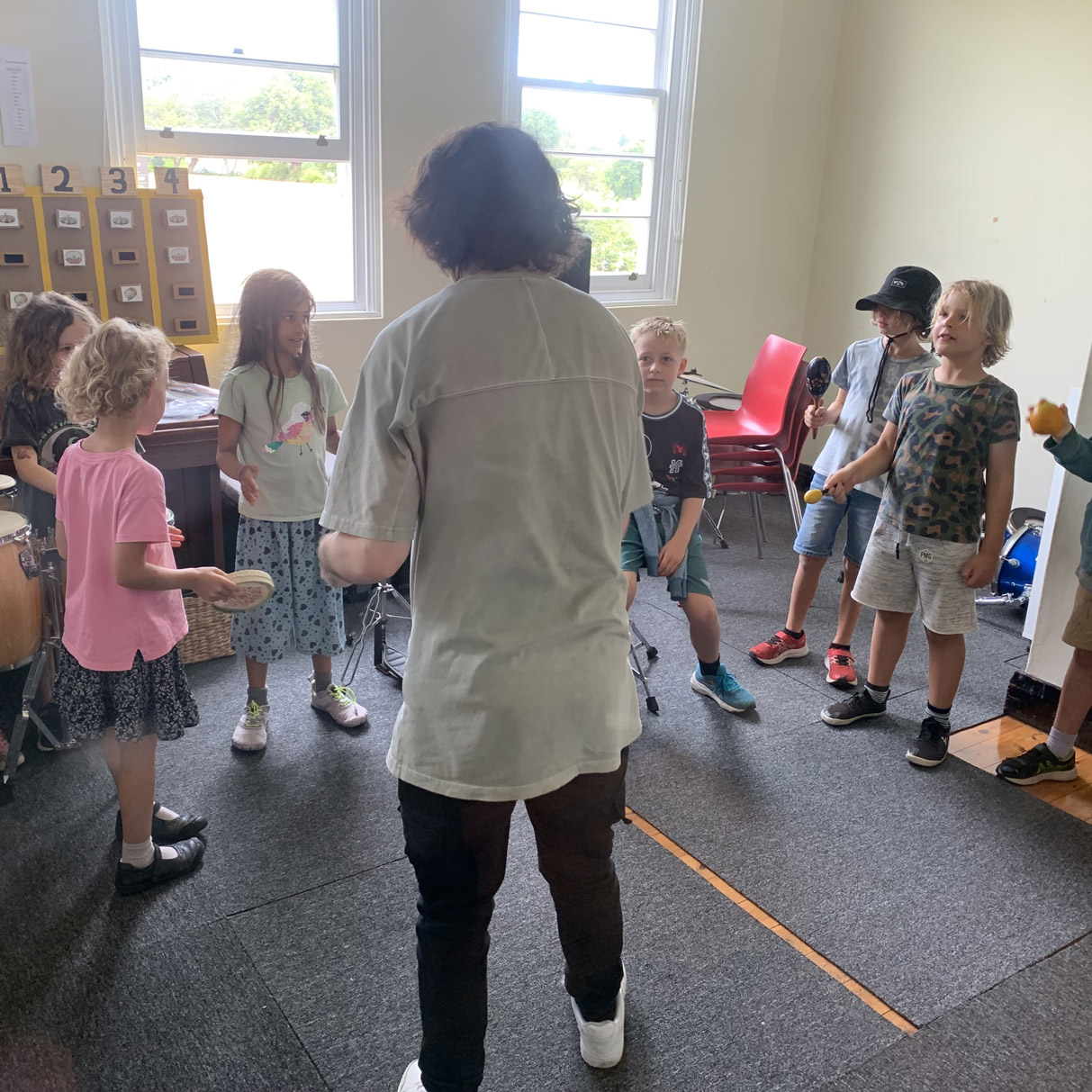
You may also like
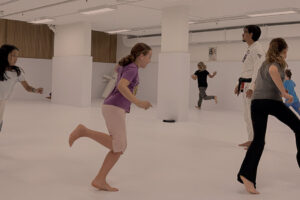
2025 Newsletter Term 02 | Issue 01
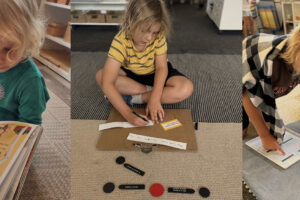
2025 Newsletter Term 01 | Issue 02
